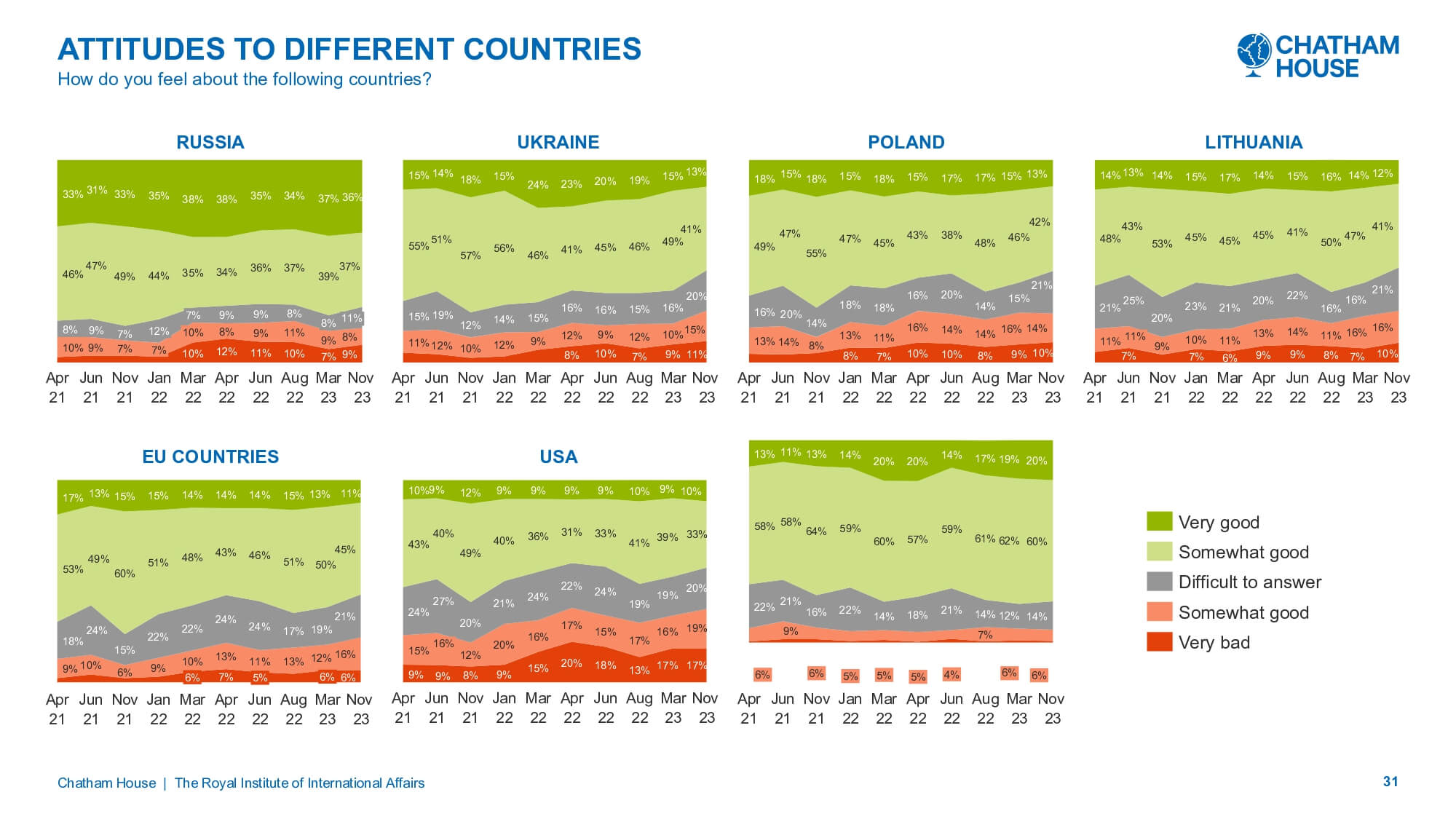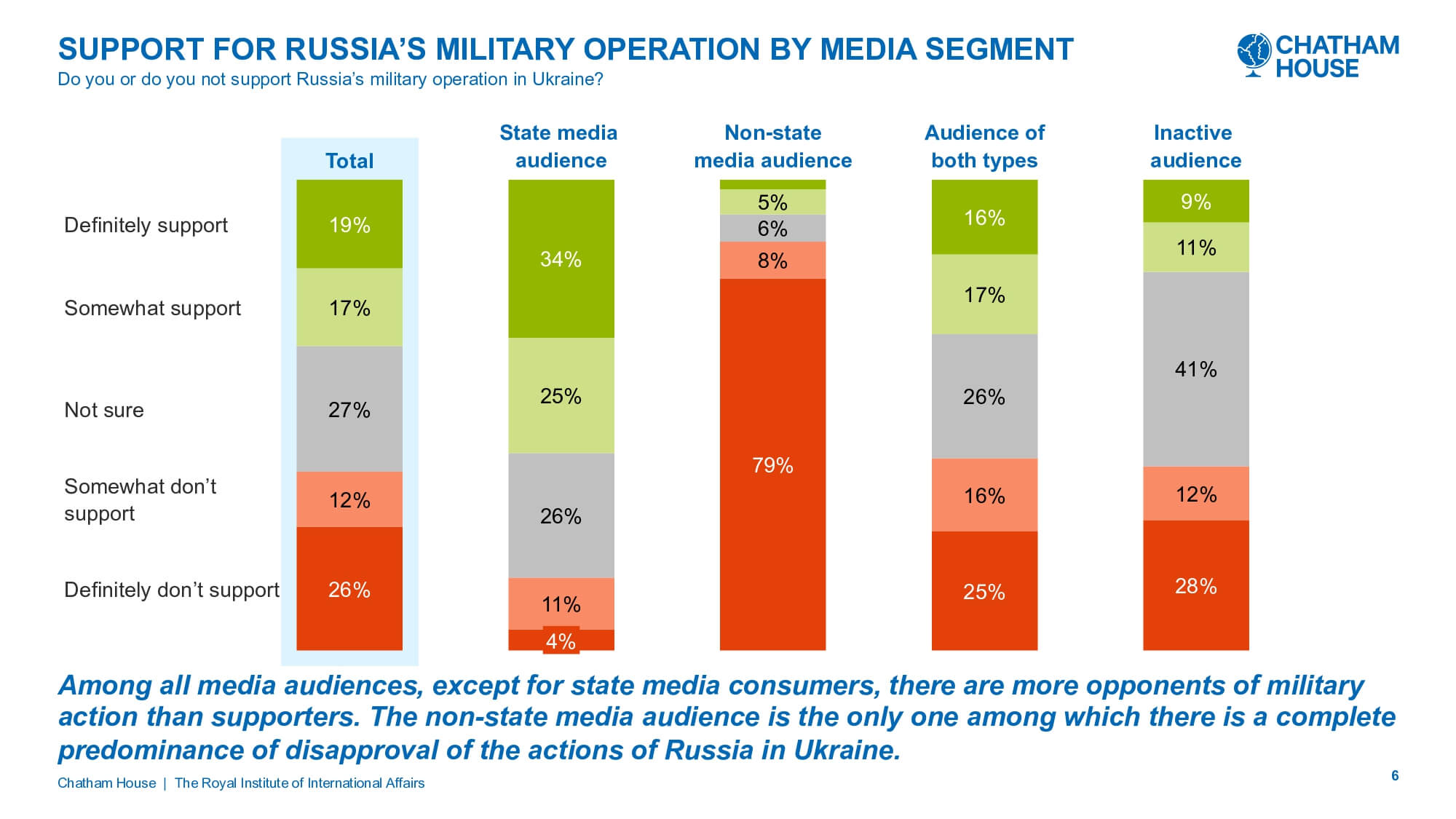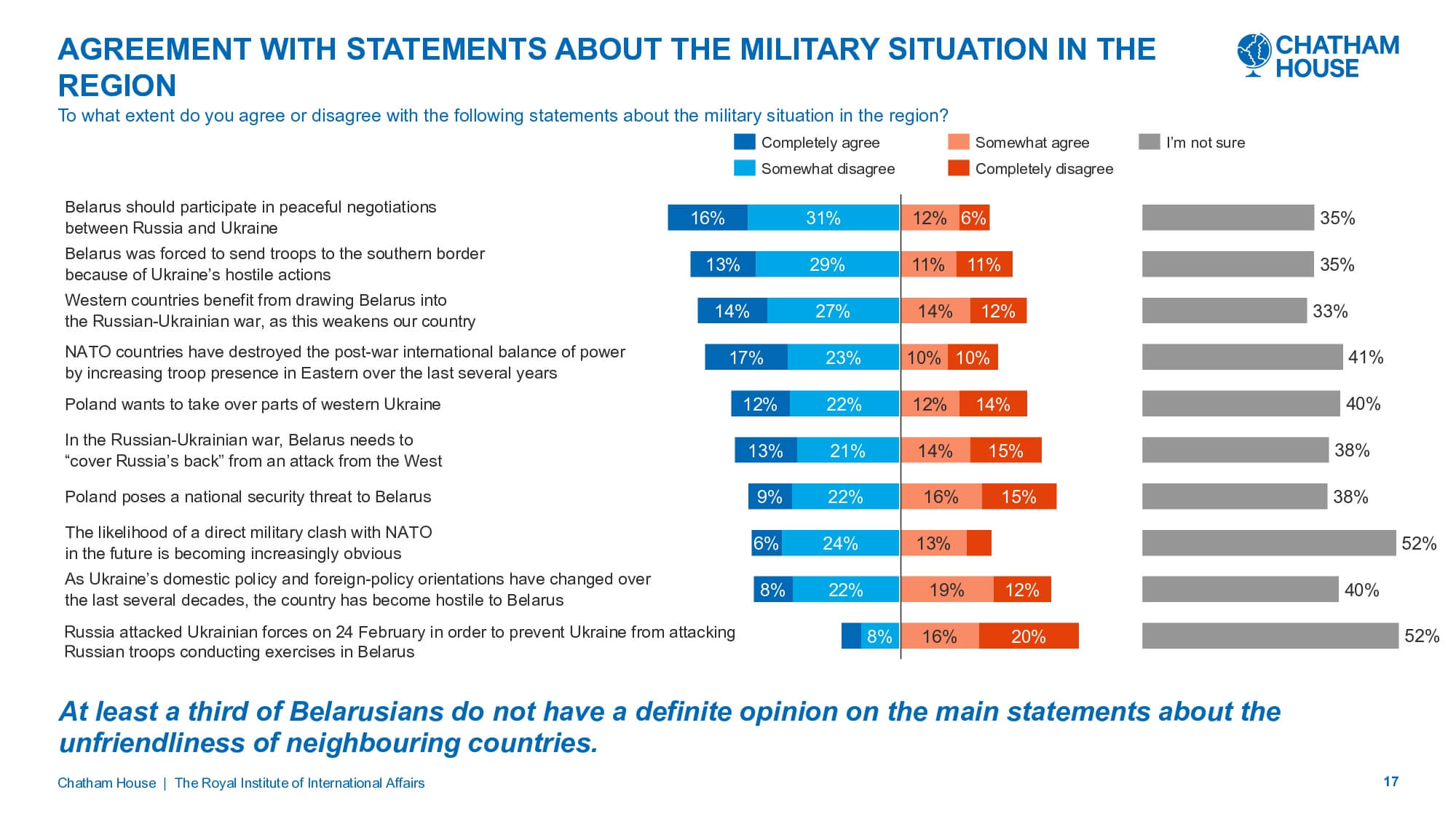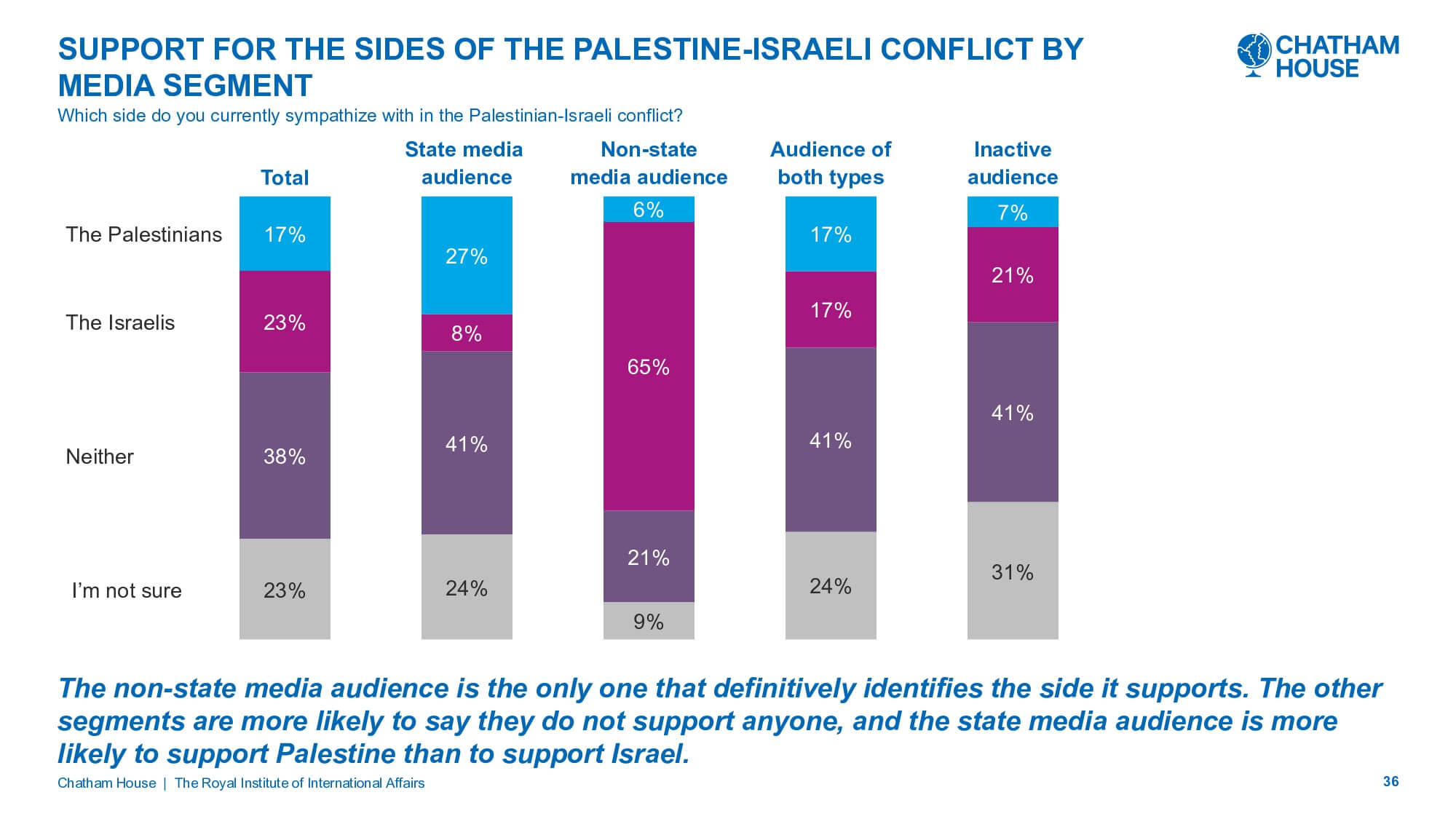A November poll by Chatham House proves that people fall for propaganda lies and shows that Belarusians’ view of Russia has stayed positive despite its assault on Ukraine.

Alaksandar Łukašenka took advantage of the Russian war against Ukraine to improve his standing, but the public does not approve of all of his political achievements that are touted by propaganda.
Most Belarusians disapprove of Russian nuclear weapons and PMC Wagner troop deployments, and fear of Belarus’ deeper involvement in the war.
Opposition leaders, who cast Russia in a negative light and support Ukraine, are struggling to reach out to the public, the poll suggests.
Respondents’ views depend on information sources
Since independent surveys are prohibited in Belarus, Chatham House’s polls conducted online among urban residents, are the only way to assess public opinion despite their obvious limitations and methodological drawbacks.
The pollster classified respondents based on media consumption: 38 percent rely on Russian and Belarusian state-controlled media; 16 percent, on non-state media; and 23 percent receive information from both types of media; and 23 percent rarely use any media.
While the state media audience is fed the narratives of the Kremlin and the Alaksandar Łukašenka regime, the consumers of both types of media, although influenced by propaganda, showed a certain flexibility in assessments of foreign political developments. Those who rarely use any media often do not have a position and find it difficult to answer. The non-state media users are mostly opponents of the Belarusian and Russian governments.
Positive opinion of Russia

The war in Ukraine has not fundamentally changed Belarusians’ view of Russia. It remains “very good” or “somewhat good” (73 percent). Ukraine fares worse with 54 percent with a favorable attitude. Russia falls behind China (80 percent), but the share of those who have a very favorable opinion of Russia (37 percent) is higher than the percentage of those with a very good view of China (20 percent).
Significant percentages support Belarus’ membership in Russian-led integration alliances: 54 percent are positive about its membership in the Collective Security Treaty Organization, 41 percent are in favor of union with Russia, and 26 percent would like to see Belarus in an alliance with both Russia and the European Union. Only 13 percent are in favor of joining the EU, while 20 percent are opposed to membership in any regional alliances.
The poll shows a slight increase in support for Russia’s war against Ukraine from 33 percent in March to 36 percent in November and a simultaneous decrease in disapproval from 44 percent to 38 percent over the same period.
Support for Russia’s military operation in Ukraine

In the last 18 months Belarusians’ assessment of the war has not changed significantly.
It is Chatham House’s first poll, in which the number of respondents who said that Russian troops in Ukraine are “definitely successful” or “somewhat successful” exceeds 40 percent, whereas 25 percent hold an opposite view.
While the number of those who believe in Russia’s victory has stood at 45 percent since March 2022, belief in Ukraine’s victory dropped from 21 percent in March 2022 to 15 percent a year later and to just 12 percent in November.
Almost half of respondents (47 percent) said that Belarus should participate in future negotiations between Russia and Ukraine.
Nearly two-thirds (64 percent) agree that Belarus should provide medical care for wounded Russian troops.
Forty-four percent are OK with repairs of Russian military equipment in Belarus.
The overwhelming majority strongly oppose any active involvement in the war, from allowing Russian troops to launch missiles from Belarus to sending Belarusian troops to Ukraine.
Less than a third approve of the presence of Russian nuclear weapons and PMC Wagner troops in Belarus.

No less than third of Belarusians do not have an opinion on “unfriendliness” of Ukraine, Poland, NATO and the West.
Łukašenka benefiting from war
Almost half of the respondents (46 percent) said that Belarus remains “neutral” due to Łukašenka’s firm stance, while 41 percent see an alliance with Russia as a guarantee of peace.
Thirty percent said that Łukašenka successfully resisted the Kremlin’s pressure to send troops to Ukraine.
Still, 35 percent fear that the Belarusian ruler’s actions may cause hostilities to spill over into Belarus, and 20 percent said that he does not control the Russian troops present on Belarusian soil.
Russian and Belarusian propaganda has definitely succeeded in brainwashing public. The radical anti-Western and anti-Polish rhetoric has borne fruit with more than 40 percent saying that democratic countries are trying to drag Belarus into the war. About a third of the respondents see Poland as a threat to national security and agree with the statement that Poland wants to annex western Ukraine.
As for the Gaza war, propaganda has been less pervasive.
Israel gets more support in Belarus than in Russia
The Russian media outlets’ openly pro-Palestinian coverage has fueled anti-Israeli sentiment in Russia and even provoked anti-Semitic riots in the North Caucasus.
An October poll by Moscow’s Levada Center found that 66 percent of Russians did not support either side in the conflict, with 21 percent backing the Palestinians and only 6 percent, Israel.
Belarusian propaganda disseminates Russian anti-Israel narratives, but its coverage is somewhat muted.
Still, among state media users, 27 percent support the Palestinians and only 8 percent support Israel.
Among independent media users Israel enjoys strong support (65 percent), with only 6 percent supporting Palestine.
Most Belarusians say they support neither. Only 40 percent have a clear position with 23 percent backing Israel and 17 percent, the Palestinians.
Both Russians and Belarusians see the US and NATO as the main culprits in the Gaza war: 45 percent in Russia and 33 percent in Belarus hold this view.
Eight percent in Russia and 17 percent in Belarus blame Hamas and the Palestinians, and 12 percent of Russians and 8 percent of Belarusians blame Israel.

The poll comes as no surprise to Belarus’ pro-democracy forces. Russia’s full-scale invasion of Ukraine prompted the opposition to support Kyiv and condemn Russia.
Opponents see EU and NATO membership as priorities for a future democratic Belarus.
Their perspective may not be very popular in Belarusian society at present, and Łukašenka remains the main beneficiary of the war now that he has maneuvered his way out of trouble by avoiding deeper involvement in the Russian aggression.
The opposition camp has no option but to promote its worldview and hope that public winds will eventually change.
Given the government’s propaganda frenzy, effort to control information flows and unprecedented crackdown on dissent, it is difficult for the opposition to reach out to voters.
Chatham House surveyed 868 respondents between 8 and 14 November 2023.
The poll was conducted using the Computer Assisted Web Interview (CAWI) method and was limited to internet users. Around 87 percent of the population of Belarus uses the internet. The margin of error (with a 95 percent confidence level) does not exceed 3.5 percent.